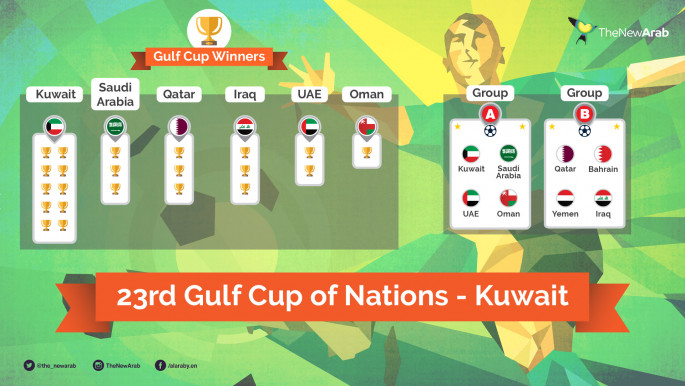
The Gulf Cup kicks off amid simmering political tensions off the pitch
Regional tensions between Qatar and a Saudi-led bloc almost forced the 2017 edition of the Gulf Cup to be cancelled, until Kuwait offered to host the tournament.
2 min read
Mukhtar Fatallah scored Saudi Arabia's second goal [AFP]
Gulf Cup hosts Kuwait opened their campaign with a losing start on Friday with a 2-1 defeat to Saudi Arabia following a nine-year absence from professional football.
Around 60,000 fans packed the Jaber al-Ahmad stadium to watch the hosts - and most successful side in Gulf Cup history - take on World Cup qualifiers Saudi Arabia.
The game marked Kuwait's return to international football following a 2008 FIFA ban, after it was found that government had interfered in Kuwaiti FA affairs.
Kuwait went one down in the 13th minute after a goal from Saudi Arabia's Salman al-Moasher.
Saudi Arabia went 2-0 up in the 52nd minute thanks to a goal from Mukhtar Fatallah. Kuwait managed to claw one back with Abdullah al-Buraiki's 60th minute goal.
The ten-times Gulf Cup winners did not manage a second with Saudi Arabia topping Group A with their 2-1 win over Kuwait.
Winners of the 2009 Gulf Cup Oman lost 1-0 to the UAE on Friday, with a penalty goal from Ali Mabkhout.
Oman pushed forward in the second-half in an attempt to grab an equaliser, but were unsuccesful thanks to some solid Emirati defending and disappointing displays up front.
"I think in the first half, we maybe showed too much respect. But then, we played well and we were good in control until that penalty," Oman manager Pim Verbeek told the post-match press conference.
"After the penalty, the UAE had a couple of more chances. It showed the inexperience of my team. We lacked the final pass and the final touch. Overall, disappointed with the result but happy with the way my team played."
Qatar thrashed Yemen 4-0 on Saturday while Bahrain are due to meet Iraq in the second day of the 23rd edition of the Gulf Cup.
Regional politics almost forced the cancellation of the 2017-2018 Gulf Cup, due to an economic blockade and diplomatic embargo on Qatar by Gulf states Saudi Arabia, the UAE and Bahrain.
Last tournament winners Qatar were due to host the games this year but the threat of a boycott by the blockading coutries threatened the Gulf Cup.
Qatar agreed to transfer the Gulf Cup hosting rights to Kuwait, following an eleventh hour deal which saw the Gulf club return to international football.
Around 60,000 fans packed the Jaber al-Ahmad stadium to watch the hosts - and most successful side in Gulf Cup history - take on World Cup qualifiers Saudi Arabia.
The game marked Kuwait's return to international football following a 2008 FIFA ban, after it was found that government had interfered in Kuwaiti FA affairs.
Kuwait went one down in the 13th minute after a goal from Saudi Arabia's Salman al-Moasher.
Saudi Arabia went 2-0 up in the 52nd minute thanks to a goal from Mukhtar Fatallah. Kuwait managed to claw one back with Abdullah al-Buraiki's 60th minute goal.
The ten-times Gulf Cup winners did not manage a second with Saudi Arabia topping Group A with their 2-1 win over Kuwait.
Winners of the 2009 Gulf Cup Oman lost 1-0 to the UAE on Friday, with a penalty goal from Ali Mabkhout.
Oman pushed forward in the second-half in an attempt to grab an equaliser, but were unsuccesful thanks to some solid Emirati defending and disappointing displays up front.
 |
| [click to enlarge] |
"I think in the first half, we maybe showed too much respect. But then, we played well and we were good in control until that penalty," Oman manager Pim Verbeek told the post-match press conference.
"After the penalty, the UAE had a couple of more chances. It showed the inexperience of my team. We lacked the final pass and the final touch. Overall, disappointed with the result but happy with the way my team played."
Qatar thrashed Yemen 4-0 on Saturday while Bahrain are due to meet Iraq in the second day of the 23rd edition of the Gulf Cup.
Regional politics almost forced the cancellation of the 2017-2018 Gulf Cup, due to an economic blockade and diplomatic embargo on Qatar by Gulf states Saudi Arabia, the UAE and Bahrain.
Last tournament winners Qatar were due to host the games this year but the threat of a boycott by the blockading coutries threatened the Gulf Cup.
Qatar agreed to transfer the Gulf Cup hosting rights to Kuwait, following an eleventh hour deal which saw the Gulf club return to international football.





 Follow the Middle East's top stories in English at The New Arab on Google News
Follow the Middle East's top stories in English at The New Arab on Google News


